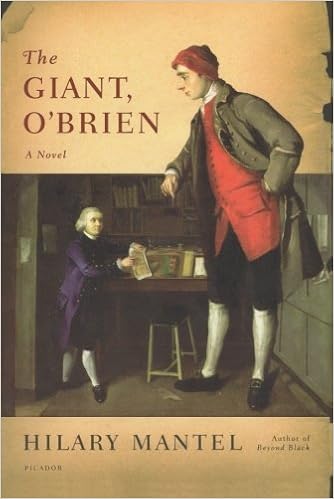
Midway through “The Giant O’Brien,” I was more than a little lost.
I couldn’t quite figure out how to take Hilary Mantel’s tale of the 18th-century Irish giant Charles O’Brien who comes to London to exhibit his massiveness and make his fortune — and crosses paths with John Hunter, a renowned surgeon, scientist, collector of bones and dissectionist.
This is a historical novel, based loosely on real people, but, unlike most examples of this genre, it hinges very little on plot, except for the inexorable convergence of the lives of O’Brien and Hunter.
A lot of talking, some story-telling, experiments, a rape and murder, speculations, degradations.
Then I happened to glance at the blurbs displayed on the front and back cover and on the first inside page of the paperback, and I saw that Paul Theroux, writing in the Chicago Tribune, characterized the book as “hilarious.” However, another blurb from Merle Rubin in Newsday described it as “somber.”
Somberly hilarious? Hilariously somber? My confusion wasn’t unwarranted.
The do’s and don’t’s of grave-robbing
Certainly, there are humorous moments in Mantel’s 1998 novel and one really funny six-page section in which Hunter spells out the do’s and don’t’s of grave-robbing to the minions he is sending forth to collect bodies for his own dissections and those of his students.
A small excerpt:
Remember that Jews bury early; where a corpse is wanted that must be very fresh, their cemeteries are very likely, very likely indeed.
Be advised that for the corpses of young children I pay by the inch. For the first foot, one shilling. Thereafter, ninepence per inch…
Remember, speed is of the essence. I will say to you what I say to my students. Do not trifle with corpses, or perform indignities on them, such as flipping the male’s penis, or introducing instruments into the orifices of young women. Be sure, be rapid, take a pride in your work. Do nothing to increase the disgust in which you are already held.
Out of context, that may seem somewhat macabre. All right, it is macabre, no doubt about it. But there is a kind of brio to it.
Soon enough gone
By contrast, much in this book is grim in accordance with its underlying theme that all of us are freaks, unfitted for existence and soon enough gone.
The Giant is trying to get his Greek Chorus of Irish hangers-on to understand that life is a lot more confusing and overwhelming than what they can see with their senses. He tells this parable:
Supposing a mosquito lands upon the back of my hand. What do his senses tell him? Ah, here is a nice even plain, very well to romp upon, I’ll tell my friends. Ah, here is nice rich blood. I can take a gallon and tomorrow come back for more, we can drink, me and my wife, we can drink a gallon a piece. Then — splat. So where is he now, the wise mosquito?
We are all mosquitoes, Mantel is saying.
Ashes
We are all Holy Innocents, slaughtered by King Herod in his effort to eliminate the threat of Jesus.
The Giant daydreams:
He thinks, my speech is silent. The verse is the mother’s lament as Herod’s hangmen come for the babies, to gibber them by their doors. My heart’s a blood-clot.
Let us say we reverse time. Suppose the Holy Innocents grow up. Suppose they grow up and one becomes a horse-thief and another a bigamist, one tells lies in the journals and another fires his neighbour’s barn, say one becomes a soldier, say one becomes a whore; say they trample through Palestine, conflagrating, confabulating, mad and dirty as Uxbridge brick-makers, say one becomes an idiot, and one becomes a king.
Where’s your Herod then?
All is ashes.
“The fruit of God’s absent-mindedness”
In a cellarful of freaks, the Giant watches his greedy, ignorant, clueless entourage instruct a cluster of pinheads on the etiquette of making a bow.
They are wonders, they are prodigies, the Giant tells them; they are nature’s curlicues and flourishes, extravagances of flesh. He moved among them, carefully, the fruit of God’s absent-mindedness; the web-footed ones, the ones with sloped heads and fish mouths, the ones with great wobbling heads and loose yellow skin dropping from their frames in folds; the ones with strange growths, the bird-faces, and the bat’s faces with folded eyes.
In truth, “The Giant O’Brien” argues, we are, all of us, “the fruit of God’s absent-mindedness.”
Even the Giant, learned in his way, soulful, is betrayed not only by those around him but also by his own body.
And Hunter — trapped in the hungry curiosity of his mind — is moving ever closer to O’Brien.
Lusting for his bones.
No comments:
Post a Comment